Leadership and Management: Theories, Styles, and Digital Influence
VerifiedAdded on 2020/12/09
|8
|2505
|222
Report
AI Summary
This report provides an in-depth analysis of leadership and management within the service industry, focusing on the context of Dockland Academy and its partners, Hazev, Haz, and Tas. It begins with an overview of classical management theories, including Frederick Taylor's scientific management and Henri Fayol's administrative principles, and their practical application. The report then explores the roles of leaders, various leadership styles such as transformational and democratic, and the influence of digital technology on both internal and external management. The report highlights the importance of morale building and vision creation in leadership, and it reviews the management and leadership styles employed by the chosen organizations. Furthermore, the report touches upon current and future management skills, and change management systems, though these sections are covered in accompanying PPTs. The analysis emphasizes the significance of adapting to digital technology and choosing the right leadership styles for organizational success.
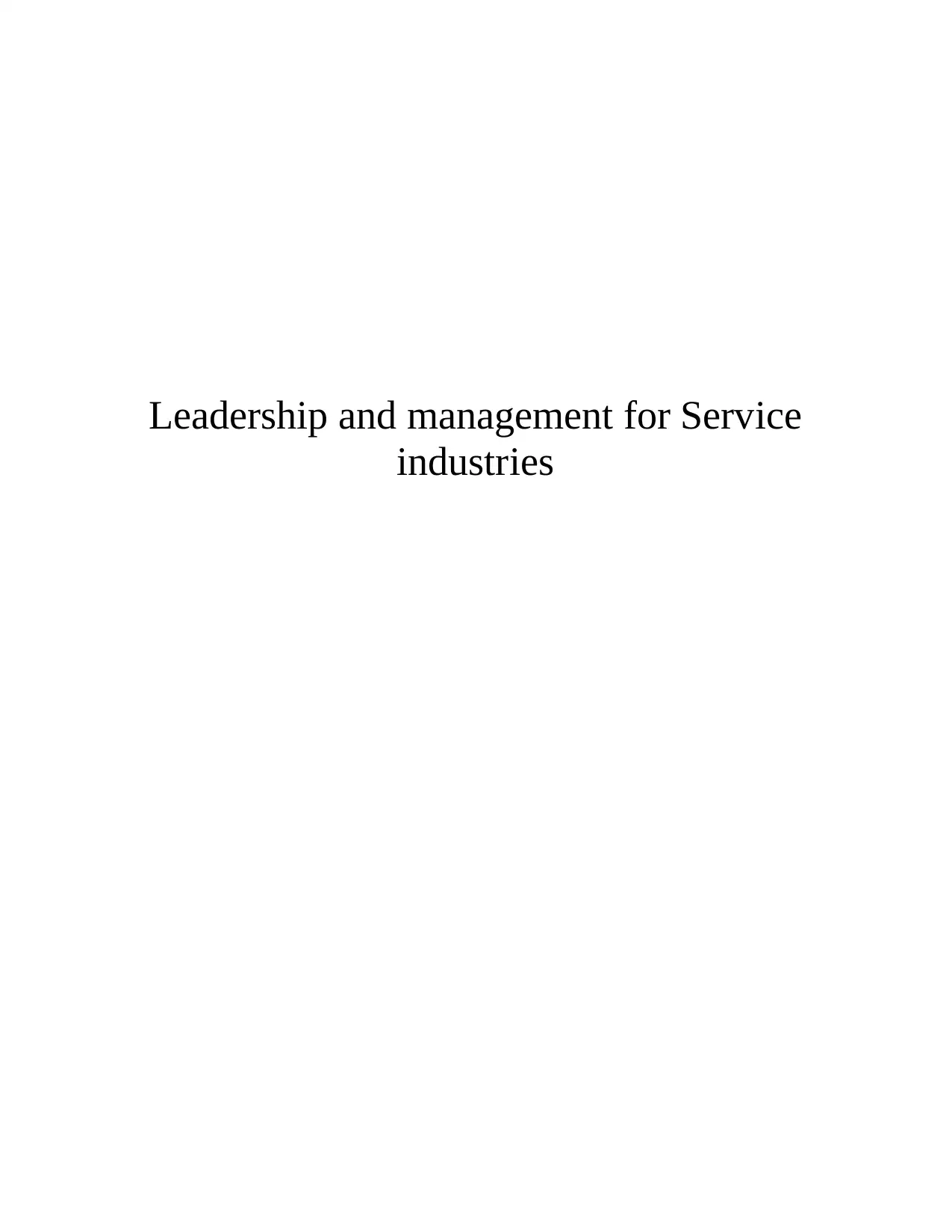
Leadership and management for Service
industries
industries
Paraphrase This Document
Need a fresh take? Get an instant paraphrase of this document with our AI Paraphraser
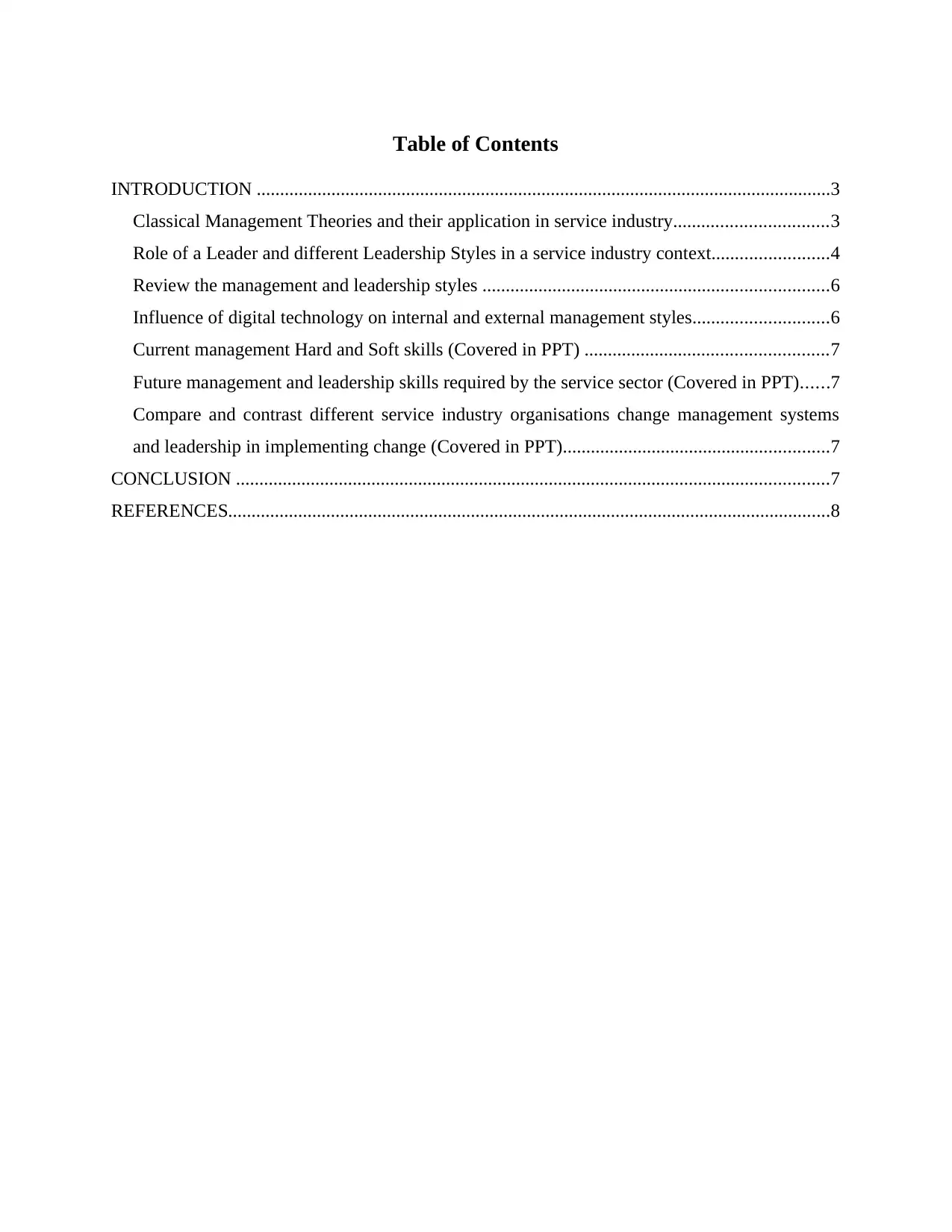
Table of Contents
INTRODUCTION ...........................................................................................................................3
Classical Management Theories and their application in service industry.................................3
Role of a Leader and different Leadership Styles in a service industry context.........................4
Review the management and leadership styles ..........................................................................6
Influence of digital technology on internal and external management styles.............................6
Current management Hard and Soft skills (Covered in PPT) ....................................................7
Future management and leadership skills required by the service sector (Covered in PPT)......7
Compare and contrast different service industry organisations change management systems
and leadership in implementing change (Covered in PPT).........................................................7
CONCLUSION ...............................................................................................................................7
REFERENCES.................................................................................................................................8
INTRODUCTION ...........................................................................................................................3
Classical Management Theories and their application in service industry.................................3
Role of a Leader and different Leadership Styles in a service industry context.........................4
Review the management and leadership styles ..........................................................................6
Influence of digital technology on internal and external management styles.............................6
Current management Hard and Soft skills (Covered in PPT) ....................................................7
Future management and leadership skills required by the service sector (Covered in PPT)......7
Compare and contrast different service industry organisations change management systems
and leadership in implementing change (Covered in PPT).........................................................7
CONCLUSION ...............................................................................................................................7
REFERENCES.................................................................................................................................8
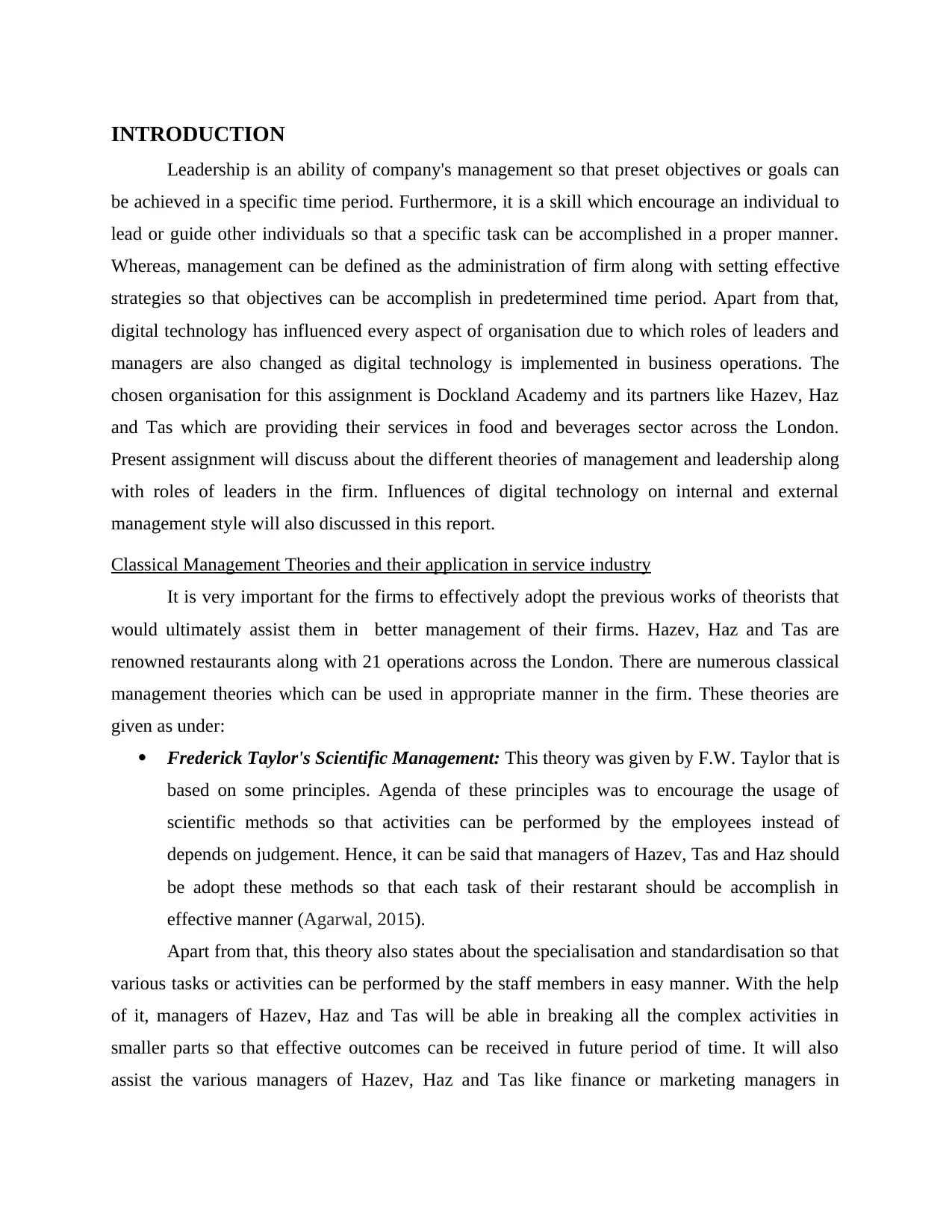
INTRODUCTION
Leadership is an ability of company's management so that preset objectives or goals can
be achieved in a specific time period. Furthermore, it is a skill which encourage an individual to
lead or guide other individuals so that a specific task can be accomplished in a proper manner.
Whereas, management can be defined as the administration of firm along with setting effective
strategies so that objectives can be accomplish in predetermined time period. Apart from that,
digital technology has influenced every aspect of organisation due to which roles of leaders and
managers are also changed as digital technology is implemented in business operations. The
chosen organisation for this assignment is Dockland Academy and its partners like Hazev, Haz
and Tas which are providing their services in food and beverages sector across the London.
Present assignment will discuss about the different theories of management and leadership along
with roles of leaders in the firm. Influences of digital technology on internal and external
management style will also discussed in this report.
Classical Management Theories and their application in service industry
It is very important for the firms to effectively adopt the previous works of theorists that
would ultimately assist them in better management of their firms. Hazev, Haz and Tas are
renowned restaurants along with 21 operations across the London. There are numerous classical
management theories which can be used in appropriate manner in the firm. These theories are
given as under:
Frederick Taylor's Scientific Management: This theory was given by F.W. Taylor that is
based on some principles. Agenda of these principles was to encourage the usage of
scientific methods so that activities can be performed by the employees instead of
depends on judgement. Hence, it can be said that managers of Hazev, Tas and Haz should
be adopt these methods so that each task of their restarant should be accomplish in
effective manner (Agarwal, 2015).
Apart from that, this theory also states about the specialisation and standardisation so that
various tasks or activities can be performed by the staff members in easy manner. With the help
of it, managers of Hazev, Haz and Tas will be able in breaking all the complex activities in
smaller parts so that effective outcomes can be received in future period of time. It will also
assist the various managers of Hazev, Haz and Tas like finance or marketing managers in
Leadership is an ability of company's management so that preset objectives or goals can
be achieved in a specific time period. Furthermore, it is a skill which encourage an individual to
lead or guide other individuals so that a specific task can be accomplished in a proper manner.
Whereas, management can be defined as the administration of firm along with setting effective
strategies so that objectives can be accomplish in predetermined time period. Apart from that,
digital technology has influenced every aspect of organisation due to which roles of leaders and
managers are also changed as digital technology is implemented in business operations. The
chosen organisation for this assignment is Dockland Academy and its partners like Hazev, Haz
and Tas which are providing their services in food and beverages sector across the London.
Present assignment will discuss about the different theories of management and leadership along
with roles of leaders in the firm. Influences of digital technology on internal and external
management style will also discussed in this report.
Classical Management Theories and their application in service industry
It is very important for the firms to effectively adopt the previous works of theorists that
would ultimately assist them in better management of their firms. Hazev, Haz and Tas are
renowned restaurants along with 21 operations across the London. There are numerous classical
management theories which can be used in appropriate manner in the firm. These theories are
given as under:
Frederick Taylor's Scientific Management: This theory was given by F.W. Taylor that is
based on some principles. Agenda of these principles was to encourage the usage of
scientific methods so that activities can be performed by the employees instead of
depends on judgement. Hence, it can be said that managers of Hazev, Tas and Haz should
be adopt these methods so that each task of their restarant should be accomplish in
effective manner (Agarwal, 2015).
Apart from that, this theory also states about the specialisation and standardisation so that
various tasks or activities can be performed by the staff members in easy manner. With the help
of it, managers of Hazev, Haz and Tas will be able in breaking all the complex activities in
smaller parts so that effective outcomes can be received in future period of time. It will also
assist the various managers of Hazev, Haz and Tas like finance or marketing managers in
⊘ This is a preview!⊘
Do you want full access?
Subscribe today to unlock all pages.

Trusted by 1+ million students worldwide
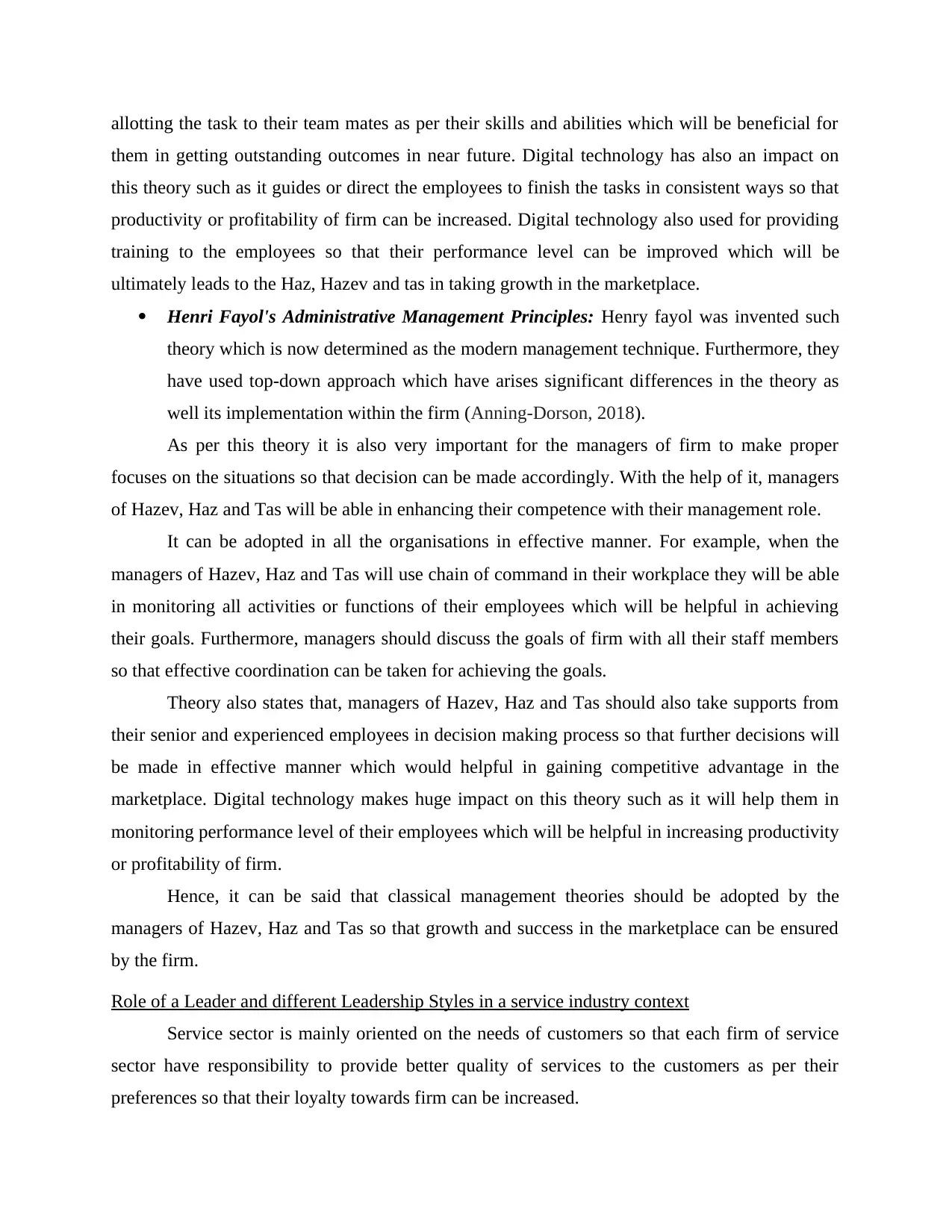
allotting the task to their team mates as per their skills and abilities which will be beneficial for
them in getting outstanding outcomes in near future. Digital technology has also an impact on
this theory such as it guides or direct the employees to finish the tasks in consistent ways so that
productivity or profitability of firm can be increased. Digital technology also used for providing
training to the employees so that their performance level can be improved which will be
ultimately leads to the Haz, Hazev and tas in taking growth in the marketplace.
Henri Fayol's Administrative Management Principles: Henry fayol was invented such
theory which is now determined as the modern management technique. Furthermore, they
have used top-down approach which have arises significant differences in the theory as
well its implementation within the firm (Anning-Dorson, 2018).
As per this theory it is also very important for the managers of firm to make proper
focuses on the situations so that decision can be made accordingly. With the help of it, managers
of Hazev, Haz and Tas will be able in enhancing their competence with their management role.
It can be adopted in all the organisations in effective manner. For example, when the
managers of Hazev, Haz and Tas will use chain of command in their workplace they will be able
in monitoring all activities or functions of their employees which will be helpful in achieving
their goals. Furthermore, managers should discuss the goals of firm with all their staff members
so that effective coordination can be taken for achieving the goals.
Theory also states that, managers of Hazev, Haz and Tas should also take supports from
their senior and experienced employees in decision making process so that further decisions will
be made in effective manner which would helpful in gaining competitive advantage in the
marketplace. Digital technology makes huge impact on this theory such as it will help them in
monitoring performance level of their employees which will be helpful in increasing productivity
or profitability of firm.
Hence, it can be said that classical management theories should be adopted by the
managers of Hazev, Haz and Tas so that growth and success in the marketplace can be ensured
by the firm.
Role of a Leader and different Leadership Styles in a service industry context
Service sector is mainly oriented on the needs of customers so that each firm of service
sector have responsibility to provide better quality of services to the customers as per their
preferences so that their loyalty towards firm can be increased.
them in getting outstanding outcomes in near future. Digital technology has also an impact on
this theory such as it guides or direct the employees to finish the tasks in consistent ways so that
productivity or profitability of firm can be increased. Digital technology also used for providing
training to the employees so that their performance level can be improved which will be
ultimately leads to the Haz, Hazev and tas in taking growth in the marketplace.
Henri Fayol's Administrative Management Principles: Henry fayol was invented such
theory which is now determined as the modern management technique. Furthermore, they
have used top-down approach which have arises significant differences in the theory as
well its implementation within the firm (Anning-Dorson, 2018).
As per this theory it is also very important for the managers of firm to make proper
focuses on the situations so that decision can be made accordingly. With the help of it, managers
of Hazev, Haz and Tas will be able in enhancing their competence with their management role.
It can be adopted in all the organisations in effective manner. For example, when the
managers of Hazev, Haz and Tas will use chain of command in their workplace they will be able
in monitoring all activities or functions of their employees which will be helpful in achieving
their goals. Furthermore, managers should discuss the goals of firm with all their staff members
so that effective coordination can be taken for achieving the goals.
Theory also states that, managers of Hazev, Haz and Tas should also take supports from
their senior and experienced employees in decision making process so that further decisions will
be made in effective manner which would helpful in gaining competitive advantage in the
marketplace. Digital technology makes huge impact on this theory such as it will help them in
monitoring performance level of their employees which will be helpful in increasing productivity
or profitability of firm.
Hence, it can be said that classical management theories should be adopted by the
managers of Hazev, Haz and Tas so that growth and success in the marketplace can be ensured
by the firm.
Role of a Leader and different Leadership Styles in a service industry context
Service sector is mainly oriented on the needs of customers so that each firm of service
sector have responsibility to provide better quality of services to the customers as per their
preferences so that their loyalty towards firm can be increased.
Paraphrase This Document
Need a fresh take? Get an instant paraphrase of this document with our AI Paraphraser
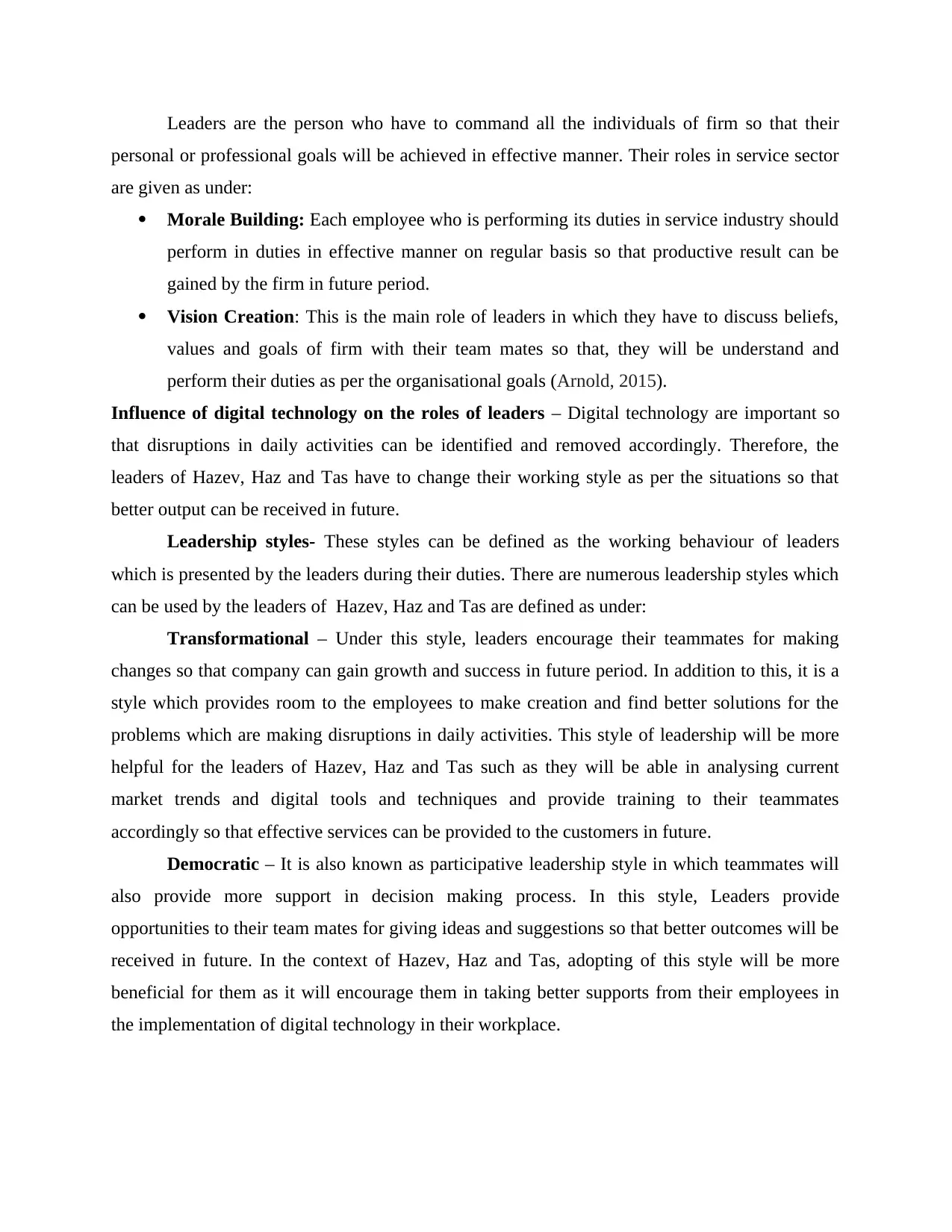
Leaders are the person who have to command all the individuals of firm so that their
personal or professional goals will be achieved in effective manner. Their roles in service sector
are given as under:
Morale Building: Each employee who is performing its duties in service industry should
perform in duties in effective manner on regular basis so that productive result can be
gained by the firm in future period.
Vision Creation: This is the main role of leaders in which they have to discuss beliefs,
values and goals of firm with their team mates so that, they will be understand and
perform their duties as per the organisational goals (Arnold, 2015).
Influence of digital technology on the roles of leaders – Digital technology are important so
that disruptions in daily activities can be identified and removed accordingly. Therefore, the
leaders of Hazev, Haz and Tas have to change their working style as per the situations so that
better output can be received in future.
Leadership styles- These styles can be defined as the working behaviour of leaders
which is presented by the leaders during their duties. There are numerous leadership styles which
can be used by the leaders of Hazev, Haz and Tas are defined as under:
Transformational – Under this style, leaders encourage their teammates for making
changes so that company can gain growth and success in future period. In addition to this, it is a
style which provides room to the employees to make creation and find better solutions for the
problems which are making disruptions in daily activities. This style of leadership will be more
helpful for the leaders of Hazev, Haz and Tas such as they will be able in analysing current
market trends and digital tools and techniques and provide training to their teammates
accordingly so that effective services can be provided to the customers in future.
Democratic – It is also known as participative leadership style in which teammates will
also provide more support in decision making process. In this style, Leaders provide
opportunities to their team mates for giving ideas and suggestions so that better outcomes will be
received in future. In the context of Hazev, Haz and Tas, adopting of this style will be more
beneficial for them as it will encourage them in taking better supports from their employees in
the implementation of digital technology in their workplace.
personal or professional goals will be achieved in effective manner. Their roles in service sector
are given as under:
Morale Building: Each employee who is performing its duties in service industry should
perform in duties in effective manner on regular basis so that productive result can be
gained by the firm in future period.
Vision Creation: This is the main role of leaders in which they have to discuss beliefs,
values and goals of firm with their team mates so that, they will be understand and
perform their duties as per the organisational goals (Arnold, 2015).
Influence of digital technology on the roles of leaders – Digital technology are important so
that disruptions in daily activities can be identified and removed accordingly. Therefore, the
leaders of Hazev, Haz and Tas have to change their working style as per the situations so that
better output can be received in future.
Leadership styles- These styles can be defined as the working behaviour of leaders
which is presented by the leaders during their duties. There are numerous leadership styles which
can be used by the leaders of Hazev, Haz and Tas are defined as under:
Transformational – Under this style, leaders encourage their teammates for making
changes so that company can gain growth and success in future period. In addition to this, it is a
style which provides room to the employees to make creation and find better solutions for the
problems which are making disruptions in daily activities. This style of leadership will be more
helpful for the leaders of Hazev, Haz and Tas such as they will be able in analysing current
market trends and digital tools and techniques and provide training to their teammates
accordingly so that effective services can be provided to the customers in future.
Democratic – It is also known as participative leadership style in which teammates will
also provide more support in decision making process. In this style, Leaders provide
opportunities to their team mates for giving ideas and suggestions so that better outcomes will be
received in future. In the context of Hazev, Haz and Tas, adopting of this style will be more
beneficial for them as it will encourage them in taking better supports from their employees in
the implementation of digital technology in their workplace.
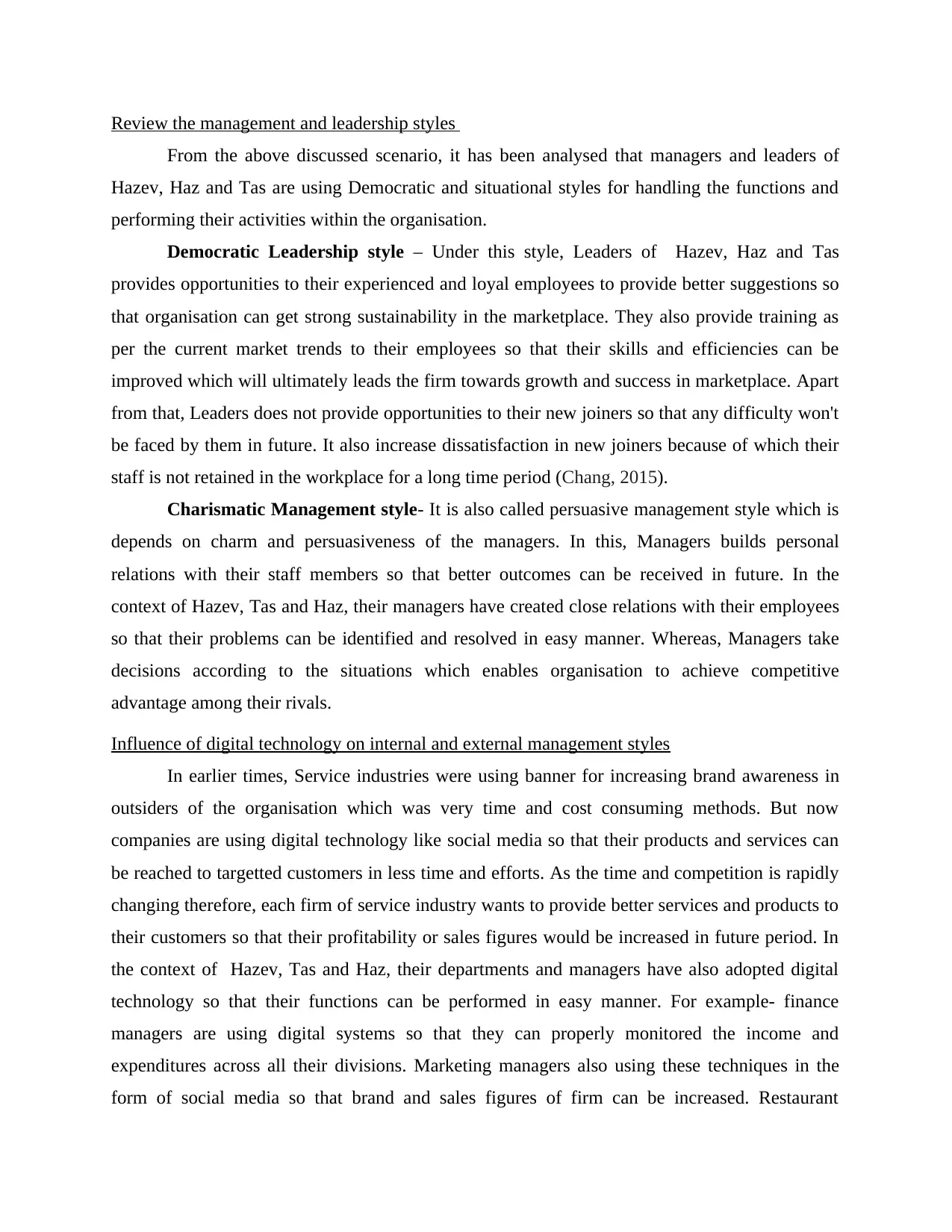
Review the management and leadership styles
From the above discussed scenario, it has been analysed that managers and leaders of
Hazev, Haz and Tas are using Democratic and situational styles for handling the functions and
performing their activities within the organisation.
Democratic Leadership style – Under this style, Leaders of Hazev, Haz and Tas
provides opportunities to their experienced and loyal employees to provide better suggestions so
that organisation can get strong sustainability in the marketplace. They also provide training as
per the current market trends to their employees so that their skills and efficiencies can be
improved which will ultimately leads the firm towards growth and success in marketplace. Apart
from that, Leaders does not provide opportunities to their new joiners so that any difficulty won't
be faced by them in future. It also increase dissatisfaction in new joiners because of which their
staff is not retained in the workplace for a long time period (Chang, 2015).
Charismatic Management style- It is also called persuasive management style which is
depends on charm and persuasiveness of the managers. In this, Managers builds personal
relations with their staff members so that better outcomes can be received in future. In the
context of Hazev, Tas and Haz, their managers have created close relations with their employees
so that their problems can be identified and resolved in easy manner. Whereas, Managers take
decisions according to the situations which enables organisation to achieve competitive
advantage among their rivals.
Influence of digital technology on internal and external management styles
In earlier times, Service industries were using banner for increasing brand awareness in
outsiders of the organisation which was very time and cost consuming methods. But now
companies are using digital technology like social media so that their products and services can
be reached to targetted customers in less time and efforts. As the time and competition is rapidly
changing therefore, each firm of service industry wants to provide better services and products to
their customers so that their profitability or sales figures would be increased in future period. In
the context of Hazev, Tas and Haz, their departments and managers have also adopted digital
technology so that their functions can be performed in easy manner. For example- finance
managers are using digital systems so that they can properly monitored the income and
expenditures across all their divisions. Marketing managers also using these techniques in the
form of social media so that brand and sales figures of firm can be increased. Restaurant
From the above discussed scenario, it has been analysed that managers and leaders of
Hazev, Haz and Tas are using Democratic and situational styles for handling the functions and
performing their activities within the organisation.
Democratic Leadership style – Under this style, Leaders of Hazev, Haz and Tas
provides opportunities to their experienced and loyal employees to provide better suggestions so
that organisation can get strong sustainability in the marketplace. They also provide training as
per the current market trends to their employees so that their skills and efficiencies can be
improved which will ultimately leads the firm towards growth and success in marketplace. Apart
from that, Leaders does not provide opportunities to their new joiners so that any difficulty won't
be faced by them in future. It also increase dissatisfaction in new joiners because of which their
staff is not retained in the workplace for a long time period (Chang, 2015).
Charismatic Management style- It is also called persuasive management style which is
depends on charm and persuasiveness of the managers. In this, Managers builds personal
relations with their staff members so that better outcomes can be received in future. In the
context of Hazev, Tas and Haz, their managers have created close relations with their employees
so that their problems can be identified and resolved in easy manner. Whereas, Managers take
decisions according to the situations which enables organisation to achieve competitive
advantage among their rivals.
Influence of digital technology on internal and external management styles
In earlier times, Service industries were using banner for increasing brand awareness in
outsiders of the organisation which was very time and cost consuming methods. But now
companies are using digital technology like social media so that their products and services can
be reached to targetted customers in less time and efforts. As the time and competition is rapidly
changing therefore, each firm of service industry wants to provide better services and products to
their customers so that their profitability or sales figures would be increased in future period. In
the context of Hazev, Tas and Haz, their departments and managers have also adopted digital
technology so that their functions can be performed in easy manner. For example- finance
managers are using digital systems so that they can properly monitored the income and
expenditures across all their divisions. Marketing managers also using these techniques in the
form of social media so that brand and sales figures of firm can be increased. Restaurant
⊘ This is a preview!⊘
Do you want full access?
Subscribe today to unlock all pages.

Trusted by 1+ million students worldwide
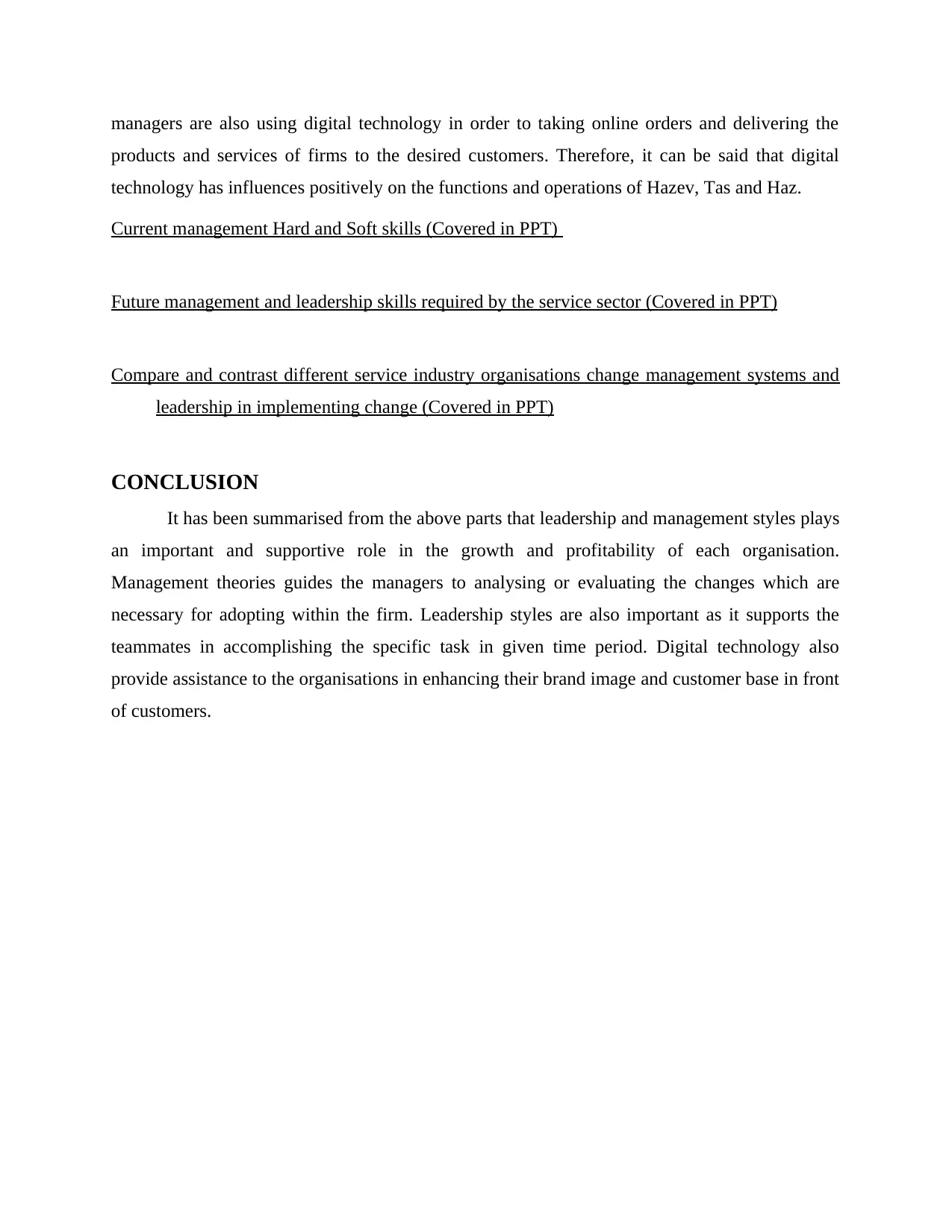
managers are also using digital technology in order to taking online orders and delivering the
products and services of firms to the desired customers. Therefore, it can be said that digital
technology has influences positively on the functions and operations of Hazev, Tas and Haz.
Current management Hard and Soft skills (Covered in PPT)
Future management and leadership skills required by the service sector (Covered in PPT)
Compare and contrast different service industry organisations change management systems and
leadership in implementing change (Covered in PPT)
CONCLUSION
It has been summarised from the above parts that leadership and management styles plays
an important and supportive role in the growth and profitability of each organisation.
Management theories guides the managers to analysing or evaluating the changes which are
necessary for adopting within the firm. Leadership styles are also important as it supports the
teammates in accomplishing the specific task in given time period. Digital technology also
provide assistance to the organisations in enhancing their brand image and customer base in front
of customers.
products and services of firms to the desired customers. Therefore, it can be said that digital
technology has influences positively on the functions and operations of Hazev, Tas and Haz.
Current management Hard and Soft skills (Covered in PPT)
Future management and leadership skills required by the service sector (Covered in PPT)
Compare and contrast different service industry organisations change management systems and
leadership in implementing change (Covered in PPT)
CONCLUSION
It has been summarised from the above parts that leadership and management styles plays
an important and supportive role in the growth and profitability of each organisation.
Management theories guides the managers to analysing or evaluating the changes which are
necessary for adopting within the firm. Leadership styles are also important as it supports the
teammates in accomplishing the specific task in given time period. Digital technology also
provide assistance to the organisations in enhancing their brand image and customer base in front
of customers.
Paraphrase This Document
Need a fresh take? Get an instant paraphrase of this document with our AI Paraphraser
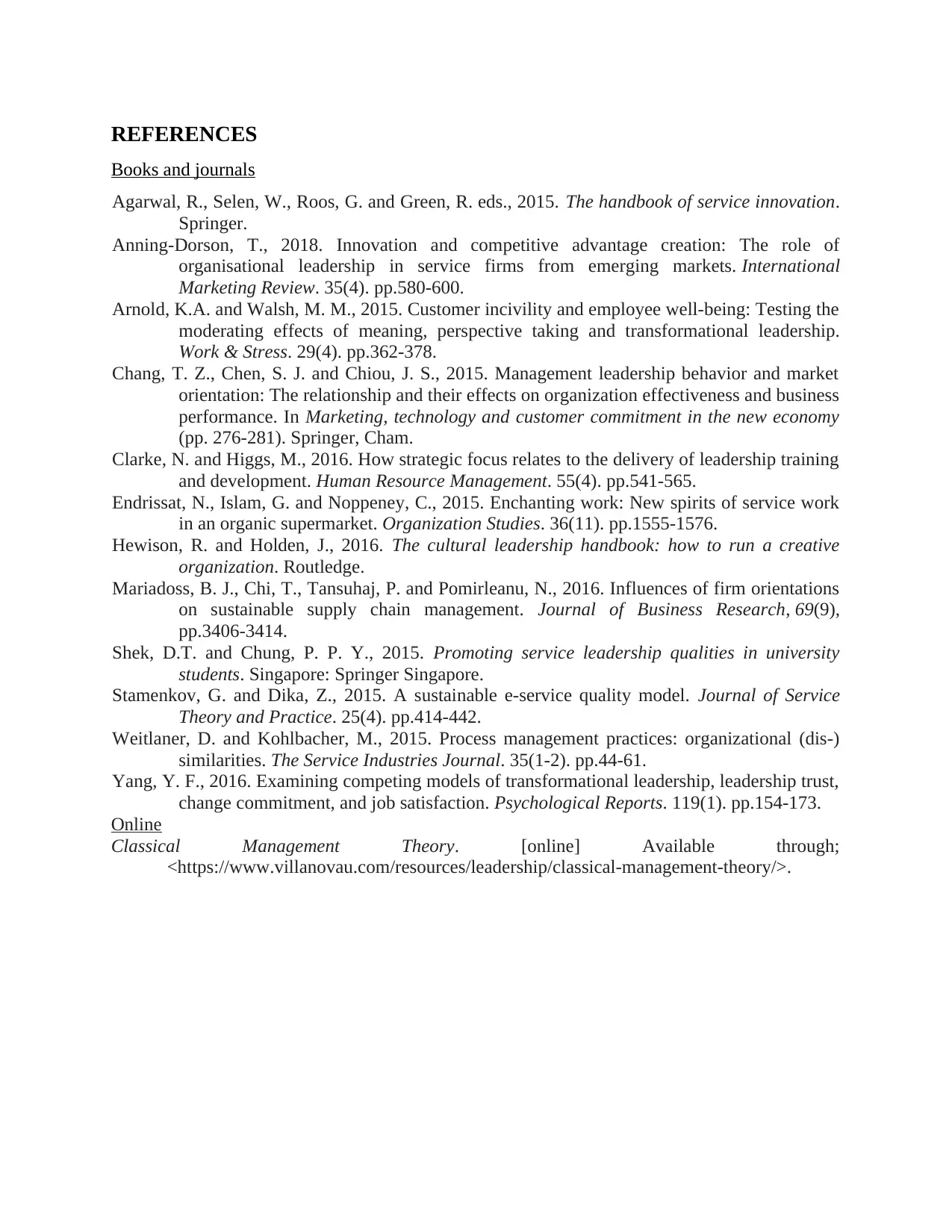
REFERENCES
Books and journals
Agarwal, R., Selen, W., Roos, G. and Green, R. eds., 2015. The handbook of service innovation.
Springer.
Anning-Dorson, T., 2018. Innovation and competitive advantage creation: The role of
organisational leadership in service firms from emerging markets. International
Marketing Review. 35(4). pp.580-600.
Arnold, K.A. and Walsh, M. M., 2015. Customer incivility and employee well-being: Testing the
moderating effects of meaning, perspective taking and transformational leadership.
Work & Stress. 29(4). pp.362-378.
Chang, T. Z., Chen, S. J. and Chiou, J. S., 2015. Management leadership behavior and market
orientation: The relationship and their effects on organization effectiveness and business
performance. In Marketing, technology and customer commitment in the new economy
(pp. 276-281). Springer, Cham.
Clarke, N. and Higgs, M., 2016. How strategic focus relates to the delivery of leadership training
and development. Human Resource Management. 55(4). pp.541-565.
Endrissat, N., Islam, G. and Noppeney, C., 2015. Enchanting work: New spirits of service work
in an organic supermarket. Organization Studies. 36(11). pp.1555-1576.
Hewison, R. and Holden, J., 2016. The cultural leadership handbook: how to run a creative
organization. Routledge.
Mariadoss, B. J., Chi, T., Tansuhaj, P. and Pomirleanu, N., 2016. Influences of firm orientations
on sustainable supply chain management. Journal of Business Research, 69(9),
pp.3406-3414.
Shek, D.T. and Chung, P. P. Y., 2015. Promoting service leadership qualities in university
students. Singapore: Springer Singapore.
Stamenkov, G. and Dika, Z., 2015. A sustainable e-service quality model. Journal of Service
Theory and Practice. 25(4). pp.414-442.
Weitlaner, D. and Kohlbacher, M., 2015. Process management practices: organizational (dis-)
similarities. The Service Industries Journal. 35(1-2). pp.44-61.
Yang, Y. F., 2016. Examining competing models of transformational leadership, leadership trust,
change commitment, and job satisfaction. Psychological Reports. 119(1). pp.154-173.
Online
Classical Management Theory. [online] Available through;
<https://www.villanovau.com/resources/leadership/classical-management-theory/>.
Books and journals
Agarwal, R., Selen, W., Roos, G. and Green, R. eds., 2015. The handbook of service innovation.
Springer.
Anning-Dorson, T., 2018. Innovation and competitive advantage creation: The role of
organisational leadership in service firms from emerging markets. International
Marketing Review. 35(4). pp.580-600.
Arnold, K.A. and Walsh, M. M., 2015. Customer incivility and employee well-being: Testing the
moderating effects of meaning, perspective taking and transformational leadership.
Work & Stress. 29(4). pp.362-378.
Chang, T. Z., Chen, S. J. and Chiou, J. S., 2015. Management leadership behavior and market
orientation: The relationship and their effects on organization effectiveness and business
performance. In Marketing, technology and customer commitment in the new economy
(pp. 276-281). Springer, Cham.
Clarke, N. and Higgs, M., 2016. How strategic focus relates to the delivery of leadership training
and development. Human Resource Management. 55(4). pp.541-565.
Endrissat, N., Islam, G. and Noppeney, C., 2015. Enchanting work: New spirits of service work
in an organic supermarket. Organization Studies. 36(11). pp.1555-1576.
Hewison, R. and Holden, J., 2016. The cultural leadership handbook: how to run a creative
organization. Routledge.
Mariadoss, B. J., Chi, T., Tansuhaj, P. and Pomirleanu, N., 2016. Influences of firm orientations
on sustainable supply chain management. Journal of Business Research, 69(9),
pp.3406-3414.
Shek, D.T. and Chung, P. P. Y., 2015. Promoting service leadership qualities in university
students. Singapore: Springer Singapore.
Stamenkov, G. and Dika, Z., 2015. A sustainable e-service quality model. Journal of Service
Theory and Practice. 25(4). pp.414-442.
Weitlaner, D. and Kohlbacher, M., 2015. Process management practices: organizational (dis-)
similarities. The Service Industries Journal. 35(1-2). pp.44-61.
Yang, Y. F., 2016. Examining competing models of transformational leadership, leadership trust,
change commitment, and job satisfaction. Psychological Reports. 119(1). pp.154-173.
Online
Classical Management Theory. [online] Available through;
<https://www.villanovau.com/resources/leadership/classical-management-theory/>.
1 out of 8
Related Documents
Your All-in-One AI-Powered Toolkit for Academic Success.
+13062052269
info@desklib.com
Available 24*7 on WhatsApp / Email
![[object Object]](/_next/static/media/star-bottom.7253800d.svg)
Unlock your academic potential
Copyright © 2020–2026 A2Z Services. All Rights Reserved. Developed and managed by ZUCOL.





